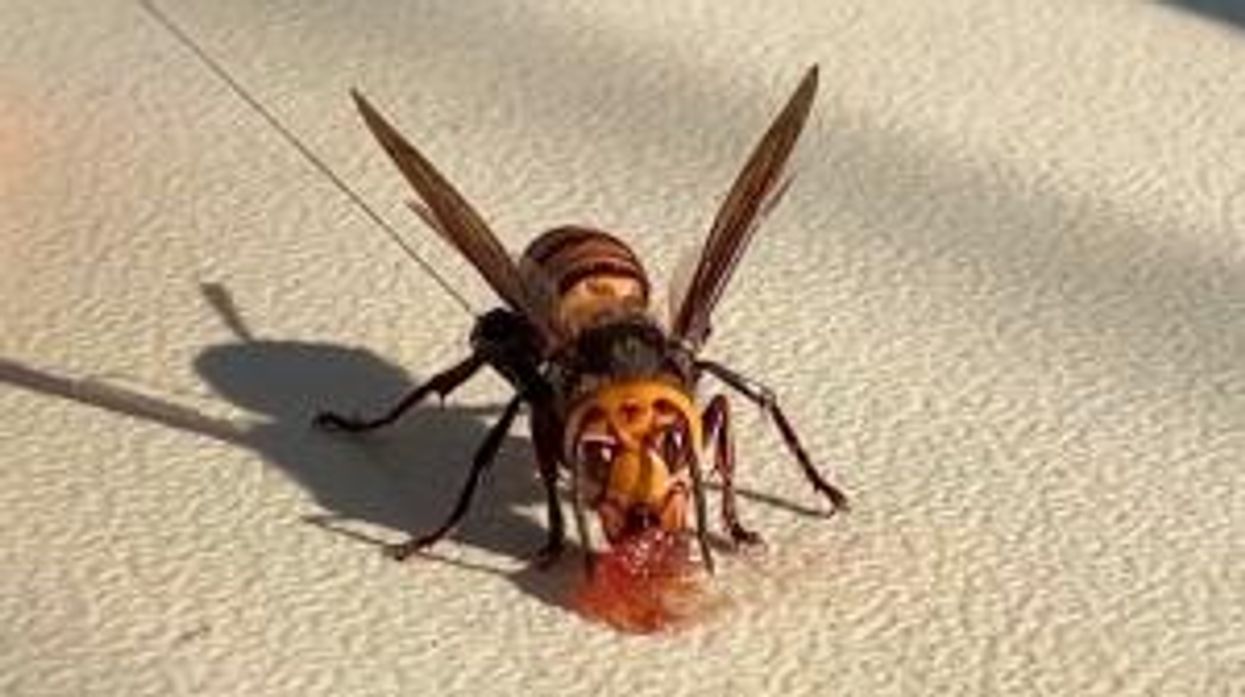Breanna Robinson
Sep 28, 2022
These Traps Could Be Our Best Weapon Against Murder Hornets
Video
Just as the ongoing cost of living crisis, soaring energy bills, and the economy continue to affect people in the UK, another problem has been added to the list: Asian hornets.
Non-native Asian hornets, or yellow-legged hornets, are an invasive species and a threat to honey bees, which have now been seen in the UK for the first time in five months.
On Wednesday (28 September), the Department for Environment, Food & Rural Affairs (Defra) released a statement indicating that the hornets made their way to Essex.
"Beekeepers and members of the public are today (Wednesday 28 September), being asked to remain vigilant after Asian hornets were spotted in the Rayleigh area of Essex," a screenshot of the statement reads on Twitter.
They also noted that the National Bee Unit confirmed the sightings of the hornets, and "monitoring" is in the works to see if there are any more in the area.
Sign upto our free Indy100 weekly newsletter
\u201cNOT NOW, ASIAN HORNETS\u201d— Jack Blanchard (@Jack Blanchard) 1664369668
This is the first confirmed sighting of the hornets in the UK since April, when a single Asian hornet was spotted in Felixstowe, Suffolk.
"The hornets raid honeybee hives by sitting outside them and capturing workers as they go in and out," says Natural History Museum expert Gavin Broad.
"They chop them up and feed the thorax to their young."
Once people learned about the insect sighting, they didn't hesitate to express their bewilderment at the UK having a bee unit, how frighting the bugs are, and wonder what other problems could possibly happen next while the economy is dwindling.
One person on Twitter wrote: "Murder hornets in the town over from me. In this economy?!"
"A plague on all your houses
"(if you can afford the #mortgages)," another quipped.
A third, finding comfort in the bee unit, wrote: "Finding it quite soothing that we have a National Bee Unit, though."
Someone else who claimed to have seen one of the hornets added: "I saw one last Thursday, and even messaged my sister about it, but I still had my doubts that it could ACTUALLY be one… but after seeing this; that's f****** scary!"
Check out other reactions below.
\u201cThe biggest news here is we have a national bee unit. \n\nI guess any videos they produce most consist mostly of\u2026 bee-roll\u201d— Andrew Stuart (@Andrew Stuart) 1664374023
\u201cAbsolutely not now, I cannot deal with an economic crisis and a massive wasp infestation, that\u2019s not how I imagined 2022 would go\u201d— jordan (@jordan) 1664372325
\u201c@martyn_amos @Jack_Blanchard_\u201d— Jack Blanchard (@Jack Blanchard) 1664369668
\u201c@Jack_Blanchard_ Asian hornets\u201d— Jack Blanchard (@Jack Blanchard) 1664369668
Asian hornets (Vespa velutina) are primarily black, with one yellow or orange band at the top of their abdomens, yellow legs, and an orange face. It is also more significant than a wasp but smaller than the native European hornet.
The hornets were introduced to France by mistake in 2004, likely through a shipment of goods from east Asia.
The Royal Society for the Protection of Birds (RSPB) said that many bees in France were consumed by the hornets, including the European honey bee and a lesser-known solitary and colonial bee species that are not as well-known.
Have your say in our news democracy. Click the upvote icon at the top of the page to help raise this article through the indy100 rankings.
Top 100
The Conversation (0)














